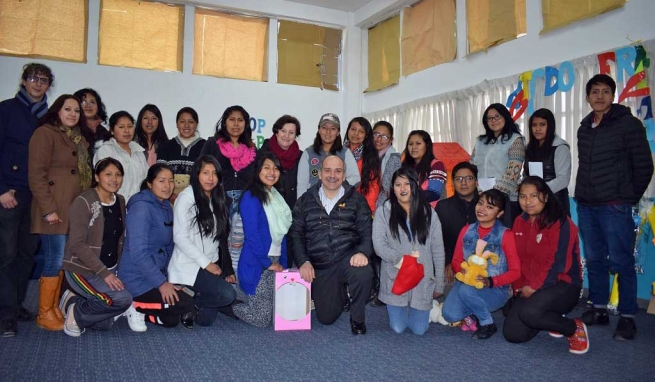BOLIVIA: New project highlighting peace within education introduced at Salesian University

(MissionNewswire) The Salesian University in La Paz, Bolivia recently hosted Professor Pedro Rosario from the University of Minho in Portugal and Professor Sonia Fuentes from the University of Chile to discuss the Arco Iris Project (Rainbow Project) facilitated by Scholas Catedras, a civil society organization originated in Buenos Aires, Argentina in 2001.
Scholas Catedras was founded when Father Jorge Mario Bergoglio was the archbishop of Buenos Aires. The goal was to transform education so that all children were integrated and learning in peace. Today, Scholas Occurrentes, an initiative of Scholas Catedras supported by Pope Francis, seeks the commitment of all social organizations to cultivate a culture of peace and works with schools of all religious and secular affiliations to reestablish this educational pact.
This initiative also aims to help facilitate these ideals at the university level. The goal is for universities to launch various projects to help aid vulnerable populations. One of these university-launched projects is the Arco Iris Project which trains teachers to work together with children who are 8-9 years old on self-learning processes, preparing them to face tasks and helping them work with greater quality and depth all while cultivating a culture of peace among students and in the classroom.
Professor Rosario invited the Salesian University to be a part of the Arco Iris project to help youth in Bolivia integrate concepts of peace into the learning environment. In a conference organized for teachers and managers at the Salesian University, Professor Rosario said that the challenge for the university was to train youth to be “better for others” and not just “to be better” in competing with or against others.
After the conference and initial training given on the project, the Salesian University will work to bring these concepts into its teaching both at the university and within projects it facilitates for the community so that all Bolivian children can be a part of this worldwide commitment to peace.
The Salesian University specializes in teacher training at the national level for both public and private sectors with a goal of improving the quality of education. Nearly 3,000 teachers educate 80,000 youth in 230 Don Bosco schools and educational programs across Bolivia. These Salesian schools and programs were founded to educate poor and disadvantaged youth and seek to counter the socioeconomic factors that negatively impact education such as low wages, politicization of educational guidelines, high rates of absenteeism and high dropout rates.
“Teachers are the backbone of the Salesian educational system and we are dedicated to providing the support and training they need,” says Father Mark Hyde, director of Salesian Missions, the U.S. development arm of the Salesians of Don Bosco. “The value of strong teachers can be seen in the accomplishments of youth that graduate from their classes. Salesian missionaries believe that access to education is critical to help youth learn job skills, improve their lives and find a path out of poverty.”
Bolivia is the poorest country in South America and has the most unequal income distribution on the continent. According to UNICEF, 60 percent of Bolivians live below the poverty line with 40 percent of those living in extreme poverty. The poverty rate is higher in rural areas where the rate increases to 75 percent of the population. It is common for Bolivians to struggle to find adequate nutrition, shelter and other basic necessities.
The geography of Bolivia contributes to the overwhelming poverty of its residents. Large swaths of the country remain undeveloped with a lack of roads and infrastructure in place, negatively impacting the indigenous farming populations who typically live there.
###
Sources:
ANS Photo (usage permissions and guidelines must be requested from ANS)
ANS – Bolivia – “Scholas Occurrentes”: the university must educate to be “better for others”
UNICEF – Bolivia




